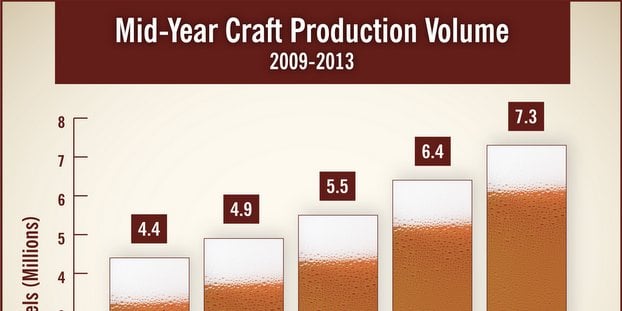With craft beer sales increasing, more craft breweries opening and beer drinkers becoming more craft savvy in their selections, it’s a great time to be a craft brewer. But that doesn’t mean it’s all wheat sunshine and IPA rainbows. The craft industry has a number of issues it is facing this year. To get the low down on what the industry will be up against in terms of business demands, legislation and regulation issues and the growing media spotlight, Craft Brewing Business caught up with the Brewers Association Director Paul Gatza to find out what the association has on its plate for 2013.

Business issues brewing
Craft brewers, get ready for competition. As more players enter the marketplace, there’s going to be a growing shelf-space battle at local retailers.
“What I think we’re going to see is that retailers will be thinking more about reserving space for local brewers and there will be a fight for the rest of the space, where you have some of your micro and regional breweries and then the national brewers, craft and otherwise, competing for that space,” Gatza explained. “What the consumer buys is going to make a huge difference in terms of who is going to keep that space.”
With the growing media coverage the industry is enjoying, it’s going to take away some of the mystery that has surrounded the craft beer segment — for both consumers and retailers. Some retailers may want a wide selection of craft beers, others may look to fill specific customer demands. Gatza expects retail buyers to come to the negotiating table with more information about the beers and a better understanding of what their customers want.
That’s just fine with the Brewers Association, which has recently stepped in front of the media to draw a firm line in the craft brewing sand, specifically with its op-ed piece in the St. Louis Post-Dispatch. The article clearly explained how some brands — such as Blue Moon and Shocktop — are brewed by large breweries and marketed as a craft brand. The issue here isn’t quality, it’s transparency.
“The Brewers Association is focused on the transparency. We feel that beer drinkers can make their own decisions about the beers they want to drink,” Gatza explained. “They are entitled to have the facts readily available to make those decisions. It seems like there has been effort by larger brewers to deflect the issue into other spaces. For example, the Miller-Coors comment about our statement was about quality and our statement had nothing to do with quality. That was their way of turning the attention away from transparency.”
“The Brewers Association is focused on the transparency. We feel that beer drinkers can make their own decisions about the beers they want to drink. They are entitled to have the facts readily available to make those decisions.” — Paul Gatza, Brewers Association directorThe association also published a list of non-craft breweries to emphasize its commitment to transparency. Though some industry members didn’t necessarily think that was appropriate, many Brewers Association members have come out to support the association’s stance.
“They’ve been sending us emails and calling saying that it’s about time the Brewers Association took a stand on this issue,” Gatza said. “That’s what leadership is all about. It’s about standing up and making a point when it may not be popular with everyone. We think the core message — brewers should be transparent in terms of who is behind the beer — is a sound one.”
Brewing law men
Leadership is going to be a much needed trait as brewers face the legislation and regulations that are coming down the pike. Taxes are always an issue, but brewers are going to be keeping their eyes on what happens with excise tax issues. The Brewers Association isn’t expecting excise taxes to go up, but they are working on legislation to lower it.
“If policies such as equivalence or an excise tax increase go into play, that could be devastating for businesses — we’re talking widespread brewery closings,” Gatza said. “We’re hoping that the House and Senate representatives will have bills going that can lower the excise tax rates for small brewers, recalibrating them to an appropriate level, and fend off any potential increase proposal.”
Tax bond issues are also being sorted out but will hopefully fall in the brewer’s favor. The Alcohol and Tobacco Tax and Trade Bureau (TTB) is reducing the bond commitment for small brewers. It’s an issue that has been percolating for some time, starting with the TTB passing a rule several years ago that allowed brewers to make quarterly tax payments instead of paying every two weeks. At that time, they also increased the bond that brewers needed to keep on file if they wanted the quarterly option.
“We petitioned the TTB years ago to go to quarterly payments to reduce some of the administrative burden, but they also upped the bond, and so no brewers did it. They didn’t want that money sitting with the TTB,” Gatza explained. He hopes that as the bond requirements ease, more brewers will be motivated to take the quarterly option.
The Food and Drug Administration (FDA), in addition to the TTB, might present some issues this year as both have active rule-making in regard to serving facts and allergens. The FDA is focused on allergen thresholds.
“The FDA is working on it, the TTB is working on it, and they don’t necessarily work together on this,” Gatza said. “What the FDA cares about in terms of serving facts is different from what TTB cares about. When the FDA has 13 things that have to be available in chain restaurants regarding nutritional information and the TTB has seven — those are two very different requirements.”
Keeping it local
At the state level, the issues that brewers will be tackling vary depending on local issues. The one constant in local legislation battles is that if you work together with interested parties, the process tends to go better. Gatza gave the example of self-distribution for small brewers. If the brewers and state wholesalers work out their issues in advance, they can come together to make legislation requests for changes that make sense for all parties.
As more breweries open this year and new small business owners battle start-up challenges, it’s still important to get involved in your local industry. Not only can you learn from other brewers who have been through the process, but you can also positively impact the issues that your business will face.
The big message to craft brewers is to get involved. The best way to do that is to actively participate in your state’s brewers guild. Through the guild, brewers are aware of the facts behind the issues at the state and federal levels because the Brewers Association works so closely with the guild leaders. When you work collectively with your fellow brewers, you can better defend your interests.







Leave a Reply
You must be logged in to post a comment.